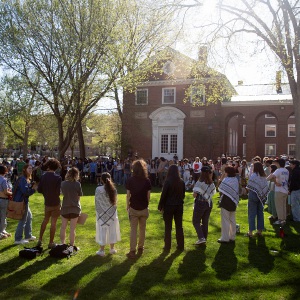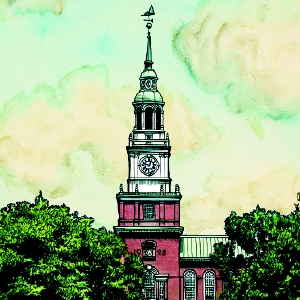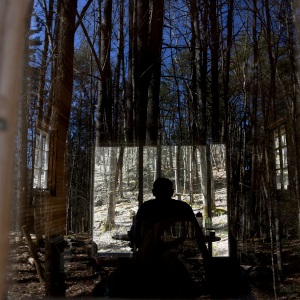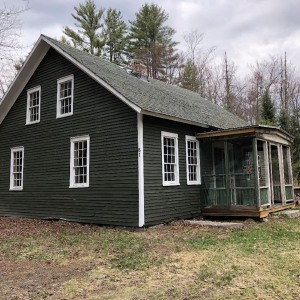Plans still in the works for Lebanon riverfront property
| Published: 10-26-2023 8:07 PM |
LEBANON — City councilors said that more study of downtown parking and of community priorities is needed before exploring development opportunities for 2.9 acres of municipally owned property between the Mascoma River and City Hall.
The City Council met on Wednesday with two advisory groups, the Economic Development Commission and the Downtown TIF Advisory Board, to discuss the piece of riverfront property that currently is used for municipal parking lots.
The commission and board, jointly tasked with studying the interest in redeveloping the property, began meeting jointly in 2022. Since then, they’ve gathered community input through public discussions, meetings with other city boards and reviews of the city master plan. From there, board members compiled a list of priorities to incorporate into a potential property vision.
“Access to the river was the consensus item for any member of our population or our constituents,” William Dunn, chairman of the Economic Development Commission, told city councilors. “(Sentiment was) 50/50 on parking. There are absolutely people who do not want to see the parking go away.”
In August 2022, the commission and board submitted a formal written request to developers for conceptual designs of a multi-use property that includes riverfront access, connects the Northern Rail Trail and the Mascoma River Greenway, and allows “opportunities for economic development” such as housing, commercial retail or offices.
However, the three conceptual designs submitted by developers did not match the vision of the board members or the public.
Each submitted design centered primarily around the construction of multi-family apartment buildings with street-level commercial spaces, with only a fraction of the property being reserved for a public green space. In other words, the designers submitted ideas for a housing project with a small park, rather than for a park with a small housing project.
“Not picking on developers, but their natural tendency is to do the biggest and most expensive development they can,” Dunn said.
Article continues after...
Yesterday's Most Read Articles
 Dartmouth administration faces fierce criticism over protest arrests
Dartmouth administration faces fierce criticism over protest arrests
 Three vie for two Hanover Selectboard seats
Three vie for two Hanover Selectboard seats
 A Look Back: Upper Valley dining scene changes with the times
A Look Back: Upper Valley dining scene changes with the times
 Norwich author and educator sees schools as a reflection of communities
Norwich author and educator sees schools as a reflection of communities
Members of the commission and board are now asking the City Council for direction on how to proceed with this redevelopment study. As Dunn noted on Wednesday, council members change over time, as do priorities.
In addition, members of the commission and TIF advisory board said they want to have a clearer and more specific vision of how the city would like to develop the property, which would also help inform developers when asked to submit ideas.
“In order for us to do the job right, we need to know what you are looking for,” Dunn told the council. “There is (public) pushback on exclusively housing, there’s pushback on taking parking away, there’s pushback on a lot of things.”
City officials agreed that the city’s downtown parking needs to be thoroughly studied before exploring redevelopment of the municipal lots. According to City Manager Shaun Mulholland, the city has not studied downtown parking since the novel coronavirus pandemic.
In addition, past city studies were designed to examine parking volumes by the hour or the day of the week. They did not specifically count parking spaces based on specific downtown activities such as the farmers’ market or Lebanon Opera House shows.
According to Victoria Smith, a TIF Advisory Board member, many vendors have told her that the Lebanon Farmers Market is their busiest and most lucrative event in the Upper Valley.
“On Thursday nights when you go to the farmers market, those (two) parking lots are full,” Smith said. “There are maybe a dozen empty spaces back there. … If we kill our parking, we are going to kill the downtown.”
Mayor Tim McNamara agreed, saying that the council does not want to destroy the vitality that has begun to establish in the downtown.
Councilors said that they will discuss funding for a new parking study for next year.
The City Council is in the early stages of preparing an operating budget for next fiscal year, which will begin on Jan. 1.
Perhaps the biggest challenge of developing this property, according to meeting participants, will be balancing the community’s desire for a public park with a plan that makes it economically feasible.
“We know people want a riverside park,” Dunn said. “Does (the city) want to pay for it? Or do we have to fund a project through TIF to pay for that? Or are we looking for a developer to take the responsibility to create (the park) and then we would have to do the ongoing maintenance?”
Commission member Chip Brown said it will be important to determine a desired scale of each project component — a park, parking and private development. The greater the park size, the smaller the remaining space will be to attract a private developer, without which the city will lose a revenue generator to fund the park’s creation.
“And if you create a $35 million development, that’s going to generate tax revenue (but) you have to think about how big that would be and what kind of park could that support?” Brown added.
Some meeting participants suggested modifying the idea of a riverside park to a more modest public green space, such as riverside trail bordered by landscaping such as shade trees.
“This is probably the biggest heat island in the city outside of (Route) 12A,” said Assistant Mayor Clifton Below. “And there’s no shade in that trail connection.”
Heat islands are urban areas where temperatures are higher than outlying areas because of a higher concentration of buildings or paved surfaces such as roads or parking lots, which block the sun’s heat from being absorbed into the ground.
Below said it may take years before the city finds a development plan that would both be financially feasible and meet the community’s wants.
“This is a much tougher nut to crack in terms of balancing this multi-variable equation,” Below said. “How do we put our parameters out that’s going to be feasible for a developer to say there’s a project that can work here? I think we’re just a few years off from that. But it makes sense to chip away at this (goal).”
Patrick Adrian may be reached at padrian@vnews.com or 603-727-3216.

 Hanover house added to New Hampshire Register of Historic Places
Hanover house added to New Hampshire Register of Historic Places
